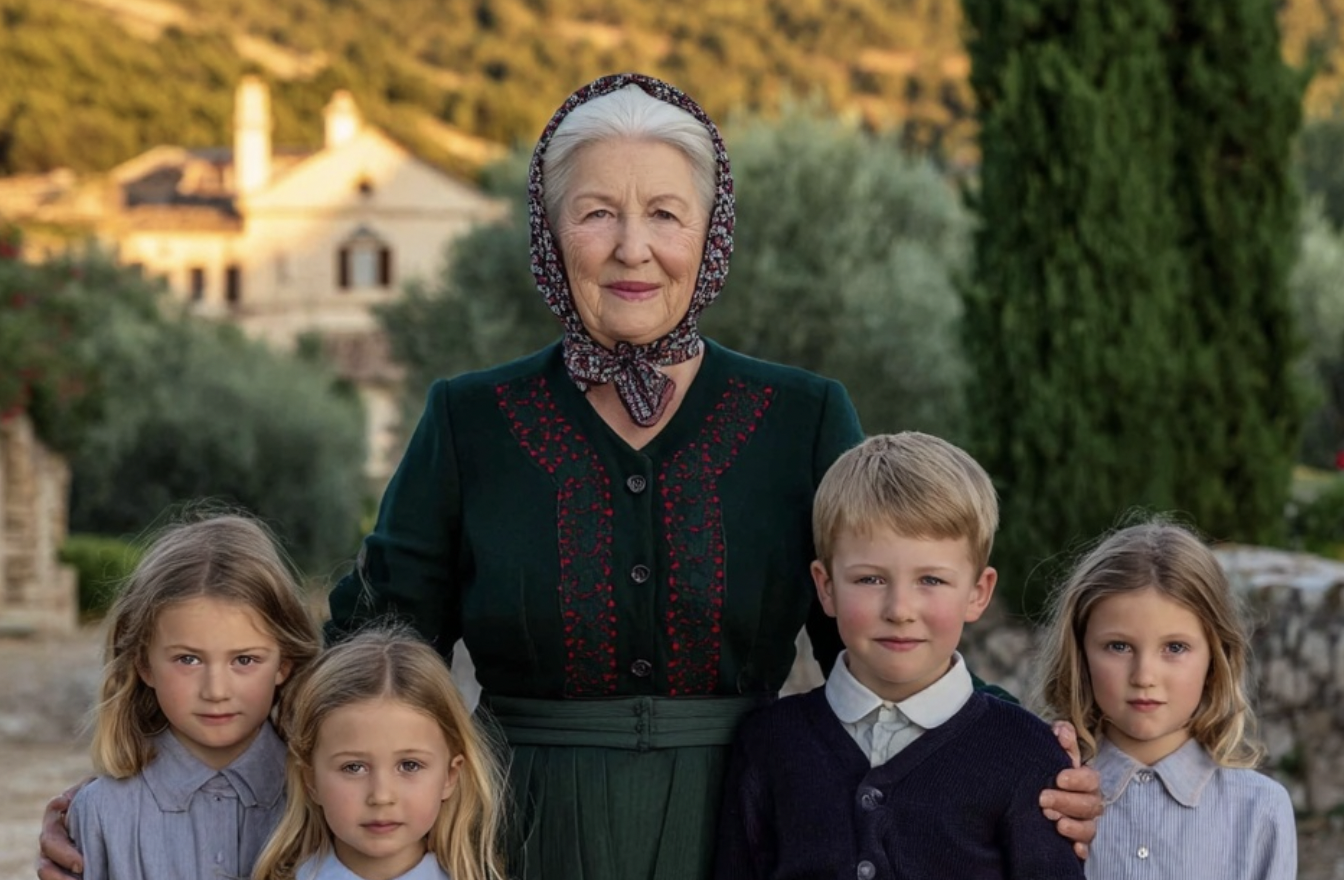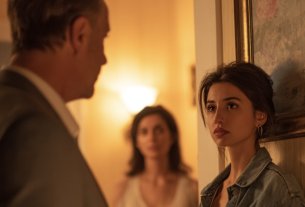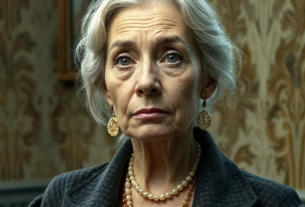I can’t live like this anymore, Anya,” Sergey said, throwing his keys onto the table. They skidded through a dusting of flour, sending a white spray across the wood like a startled gust of snow.
I froze with the dough clinging to my fingers. From the other room, the children fell silent, as if the storm had reached them before it broke. I forced my breath to stay even though my heart hammered against my throat. I couldn’t let fear show. Not yet.
“What happened?” I asked, my voice betraying a tremor I tried to swallow.
Sergey looked through me, not at me—an empty, practiced stare I’d come to recognize. Cold. Detached. Lately it had become his only face. I wasn’t a wife anymore. Not even a person. Just an obstacle he needed to step around.
“That’s it,” he snapped. “This job, this house, the debts piled to the ceiling—and you, forever with your dough and your rolling pin!”
I set the rolling pin down with deliberate care. Wiped my hands on the apron, already blotched with jam. It’s strange, the details you notice when your life begins to tilt: the sparkle of granulated sugar, a swirl in the wallpaper, the shallow crease carving his forehead. Everything suddenly sharpened into focus.
He poured himself a glass of water and drained it in one swallow. The glass kept the shadow of his fingerprints—resin from the sawmill—ghostly marks I would, absurdly, think to scrub off tomorrow.
He let the silence drag, then, almost gently, said, “There’s someone else. In the next village. Her name is Marina.”
The air thickened; it hurt to breathe, as though the room were shrinking around me. My heart plunged.
“We’ve been seeing each other six months,” he went on, staring out the window. “She’s young. No kids. No debts.”
Each word landed like a blow. So that was the arithmetic: worn out, with children, with loans—that was me on his ledger. He didn’t ask if I still loved him. I wasn’t sure anymore either. Routine can mimic feeling for years.
“I’m moving in with her. Tomorrow. My things are packed.”
He nodded toward the hallway. Only then did I register the bulging sports bag. How had I missed it? The way I’d missed everything else—late returns, hidden messages, his growing indifference to the children.
“And the kids? The house? The mortgage’s in my name, but we’ve been paying it together…”
“They’ll be fine. You’ll be fine,” he said—someone else’s script in his mouth. “You always manage.”
Dasha appeared in the doorway, thin and pale in an oversized T-shirt. Behind her hovered Sasha, eyes too wide with understanding no child should carry.
The conversation that followed was short and brutal. Sergey made no attempt to soften the truth—it fell heavy and graceless, like spring snow that crusts and breaks underfoot.
Then he left. No hug, no goodbye. A door slammed. Gravel crunched under retreating steps. Just like that, we were four in a house suddenly crowded with loans, silence, and questions that had no answers.
Little Tim kept asking if Dad was still angry. The youngest didn’t understand. Mila, a little older, did. We’d been abandoned.
I didn’t sleep that night. I stared at the ceiling until dawn washed it gray. No tears, no pain—just one relentless question: How?
How do I feed four children? How do I pay a mortgage I’d signed before the wedding—“It’s simpler this way,” Sergey had said, and now that “simplicity” was a millstone at my throat.
Two months slipped by. Sergey didn’t return. A week after he left, he called from an unknown number to say he wouldn’t be taking the rest of his things and could only manage minimum child support. Pennies dressed as duty.
Neighbors told me to sell the house and move in with my mother. Into her one-room place? She barely scraped by on her pension. Where would we all sleep—on top of each other, like stacked worries?
Find a new job? Doing what? My accounting certificate was fifteen years stale. These days I was better at counting diapers than balance sheets.
The first delinquency notice arrived from the bank. At night I lay in the dark, doing math with my breath.
Salary minus medicine. Minus school supplies. Minus utilities.
Another week ahead. Another month. Another year.
Minus food. Minus electricity. Minus school lunches. Minus medicine. Minus mortgage. Always minus. No matter how I sliced it, the numbers bled red.
One morning Dasha whispered that Tim had a fever. The flu—of course—at the exact worst moment. We had no medicine left. Eight hundred rubles on the card. Seven days to payday. An eternity.
Then Mila’s teacher took me aside: “Anya, are you sure she eats breakfast? She’s been getting dizzy in class.”
My heart cracked. Mila had been splitting her sandwich with her brother every morning. Quietly. And I hadn’t seen it. Mother of the year.
That night I sat with the calculator until the buttons blurred. The sums didn’t just fail; they scattered like cockroaches under light. Not a single plus. Only minus upon minus.
Sasha padded over with a drawing—a little house with a green roof.
“This is our new home, when we have money,” he said.
I turned away so he wouldn’t see my eyes sting. A new future. What future?
A knock came then. It was the librarian, Natalia Sergeyevna.
“Anya, I need help,” she said. “Our cafeteria lady quit. District inspection in a week. Could you fill in? Just for a couple of weeks?”
Bake rolls. Brew tea. The pay was small—but it was something. I said yes. One foot in front of the other—that’s how survival walks.
On the first day I brought twenty buns. They vanished within an hour.
Second day—forty. Gone, too.
“What do you put in these?” people asked.
“My soul, a little butter, and a handful of desperation,” I thought. Turns out, that rises.
Within a month I had regulars. I woke before dawn to bake, hustled the kids to school, worked the cafeteria, and slept three hours a night. My neighbor shook her head. “You’ll burn out.”
I looked at the bank’s second warning letter and thought: Not yet. Not while they need me.
In November, Tim fell ill again. I was dozing by his bed when the phone rang. A man introduced himself as Viktor Andreevich from the district administration. He’d tried my buns at the library.
“We’re opening a new MFC building,” he said. “We’ll need a cafeteria. Bigger space, proper equipment. We’d like you to run it.”
“I can’t,” I blurted. “I have children…”
“We’ll help. Register as a sole proprietor. There’s small-business support. This could be your chance.”
When I looked up, Dasha was in the doorway. “What happened?” she asked. I told her.
“And you’re going to say no?” she challenged.
“How can I manage? The illnesses, school, the loan…”
“And if you don’t try?” Her voice tightened. “Mom… Mila sold her colored pencils to Sveta so I could go on the field trip.”
I went still. I hadn’t known. Maybe I hadn’t wanted to know. But they saw everything—my sleepless nights, my stubborn fight.
I checked the calendar. Twelve days to the next mortgage payment.
“If I say yes, will you watch the little ones while I’m in town?”
“Of course,” she said. “Valya will help. She promised.”
“Then I’ll call Viktor Andreevich tomorrow. We’ll try.”
She hugged me. “We’ll make it, Mom.”
I smoothed her hair and whispered to myself: Maybe we will. There must be light somewhere.
Three years flew by in one long breath. “Anya’s Buns” became a local favorite. We expanded the menu, hired help, knocked a third off the mortgage.
Sasha drew the café with a line of smiling people and, above them, an angel. He said it was Grandpa. He never got to see any of this. Maybe he was watching now.
We worked constantly. The kids did everything they could. Dasha kept the books like a pro. Mila washed dishes after music school. Tim folded napkins so carefully it made my chest ache.
One afternoon a pair walked in—a woman in an elegant coat and a tall man in his fifties.
“That’s her,” the woman told him. “The Anya I mentioned.”
Her name was Elena, owner of a family café chain called Gorodok. The man was an investor.
“We were passing through,” Elena smiled. “I insisted we stop. I’ve heard about your buns.”
Mikhail ordered coffee and one of everything. Elena asked about ingredients, then set down her pen.
“We want to buy your recipe and the rights to use the name ‘Anya’s Buns.’ We’ll make it worth your while.”
“But why?” I asked. “You have your own kitchens, your own recipes.”
“Nothing like yours,” Mikhail said. “We have precision. You have soul.”
The number they named would clear the loan—and more. But this café was the spine that held us upright.
“We’re not asking you to close,” Elena added. “We want to open a branch in the regional center. Franchise. With you at the helm.”
“In the city?” I faltered. “What about the kids…”
“Move with us,” Mikhail said. “We’ll help with housing. Good schools.”
Elena tilted her head. “Do you have children?”
“Four,” I said, smiling despite myself. “Fifteen down to eight.”
They exchanged a look.
“Perfect,” Elena said. “A family café run by a real family. That’s our brand.”
At home I gathered everyone for a family council. Dasha’s eyes shone—the city, opportunities, a clean slate. Mila worried about her music school. Sasha found art studios online within minutes. Tim asked the biggest question:
“Are we selling the house?”
“No, sweetheart,” I told him, pulling him close. “It’s still ours. We’ll come back on weekends.”
“And we’ll finish the loan,” Dasha said, all business. “Right?”
I looked around at their faces and saw not children, but co-builders. They had walked every mile beside me—without complaint, with patience, with love.
Maybe fate was finally softening.
The deal closed in a month. We nearly wiped out the mortgage, bought an old but faithful car, packed our lives into boxes.
On our last evening in the village, a knock sounded. Sergey stood on the step. Thinner. Older. As if life had finally caught him.
“I heard you’re leaving,” he said, shifting from foot to foot.
“Yes,” I answered evenly. “To the city. I’m opening a café.”
“Your own business?” He blinked. “Huh.”
Tim peeked from behind me and froze. Sergey stared at his son. No joy, no sorrow. Just the gaze of a stranger.
The others came to stand with us, silent in a neat line—Dasha at the front, as always. Sergey held out an envelope. “For the housewarming.”
“Thanks,” I said, handing it straight to Dasha. “For ice cream.”
He asked to come in to say a proper goodbye. I shook my head, gently but firm. “We have an early morning. A lot to do.”
He faltered, then said what I never expected to hear: “I’m proud of you, Anya. You did it. Without me.”
“Because of you,” I said, and found myself smiling. “If you hadn’t left, I’d never have learned what I can do.”
He flinched—wasn’t the response he wanted. Then, quietly, he asked if he could call the kids sometimes. Of course, I said. He’s their father.
He lingered on the porch, then walked toward the gate—heavy steps, slumped shoulders, as if he carried not only memories but the life we were choosing to leave behind.
Dasha closed the door and wrapped her arms around me. “I’m proud of you, Mom. You’re the best.”
We stood in the middle of the home we almost lost and saved—not by luck, but by stubborn love.
Tomorrow a new life would begin.
But the true gift wasn’t the contract, the money, or even the café.
The gift was myself.
The strength I found.
The strength that saved my children.
Saved our family.



